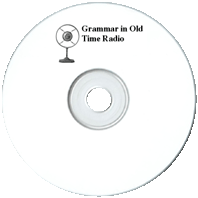

Radio and Movies, later Television, have been major influences in unifying what has become known as "General American" English.

5 old time radio show recordings
(total playtime 2 hours, 51 min)
available in the following formats:
1 MP3 CD
or
3 Audio CDs
Text on OTRCAT.com ©2001-2026 OTRCAT INC All Rights Reserved. Reproduction is prohibited.

One of the delightful yet frustrating aspects of the English language is that it is a "living tongue". In other words, English can and well adapt to the needs of the speaker and his local culture, and there are several instances of cultural idioms becoming accepted throughout the English-speaking world. To understand this, we need to look no further than the great bard himself, William Shakespeare. No scholar would argue that the playwright mastered English in a way that has yet to be matched, but the Elizabethan grammar of the Shakespearian stage would be unintelligible in a modern setting.
There are countless examples of colloquialisms making their way into formal English, but one of the most notorious examples is "ain't". A contraction for am not, is not, are not, has not, and have not, the word has been part of the English vernacular for centuries and is becoming increasingly accepted in informal settings. However, it has always been associated with lower socio-economic classes and poverty-stricken regions. The Kraft Music Hall with Duke Ellington as a guest makes a compelling case for using ain't, while Fibber McGee and Molly make the whole neighborhood suffer when they bet that neither of them will be the first to use the a-i-n-t-word.

Radio and Movies, later Television, have been major influences in unifying what has become known as "General American" English. General American is loosely defined as a Midwestern accent according to the theory that it is the accent most commonly used and understood in North America. Network media, which for the most part originates from Hollywood, has introduced a "California" or "West Coast" influence into General American, however, this is moderated somewhat by the fact that California English is largely shaped by the influx of Midwestern farmers in the mid-Twentieth Century. A telling indication of radio's influence on national speech patterns can be seen in the British radio's abandonment of the requirement that British news presenters must use Received Pronunciation after WWII in favor of more regional dialects.
Text on OTRCAT.com ©2001-2026 OTRCAT INC All Rights Reserved. Reproduction is prohibited.
You have reached the maximum number of votes for a unregistered user.
Please login or create a new account to continue...
You have reached the maximum number to down votes in this page.



Grammar Disc A001
|
Add Audio CD to Cart - $5.00 |
Grammar Disc A002
|
Add Audio CD to Cart - $5.00 |
Grammar Disc A003
|
Add Audio CD to Cart - $5.00 |
Please wait...
COMMENTS
Be the first to comment on "Grammar"
Leave a comment